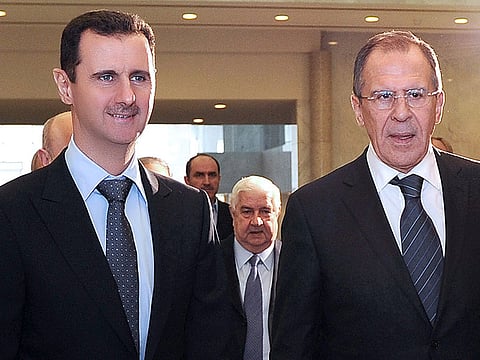Arab-Russian ties remain problematic
Moscow’s costly attempt to project power in the Middle East

Arab-Russian relations are complex and multi-faceted. Addressing this issue has always been difficult since Arab elites, governments and the Arab public all bring a diverse range of views to the subject. They also hold different opinions about Russia.
Yet, it is not so difficult to notice that Arab-Russian relations have always been dictated by “high politics”. Compared to the US, Russia has, for example, failed to penetrate Arab societies in terms of culture and values in any meaningful way. This remains true despite the fact that thousands of young Arabs, particularly those whose home countries were aligned to the former Soviet Union, spent years studying in Russia and other former Soviet republics. In many cases, they also intermarried.
Indeed, the earliest encounter between what would become Russia and the Arab world can be traced back to the 10th century, when a number of Slavic tribes embraced Islam.
Yet one cannot speak about Arab-Russian relations per se before the First World War. Arab interest in Russia was stoked only after the triumph of the Bolshevik Revolution in 1917.
It was in the wake of that revolution and the dissolution of the Ottoman Empire that the previously clandestine Sykes-Picot agreement came to light, and its full force was felt in the carving up of the previously Ottoman-dominated Arab Levant. The Bolsheviks’ opposition to western imperialism and their adoption of socialism as a socio-economic system that sought to achieve social justice won them respect among the Arab elite. Communist parties aligned with Moscow were thus established across the Arab world.
Yet, relations between the Arab states and Russia became complicated with the establishment of the State of Israel. The Soviet Union was the first country to grant de jure recognition to Israel, only days after its inception. By comparison, the US did not grant de jure recognition to Israel until the following year, although it was the first country to grant Israel a de facto recognition.
The damage done to Russian-Arab relations by Soviet-Israeli ties was mitigated by the Cold War atmosphere. As part of the superpowers’ competition to win influence in the Middle East, Moscow agreed to sell weapons to Arab states to defend themselves against Israel. Soviet pressure helped in halting the tripartite aggression against Egypt in 1956, too. Moscow’s offer to finance and build the Aswan Dam further consolidated the influence and presence of the Soviet Union in the Arab world, represented by the two vital requirements of defence and development.
Arms shipments and other forms of assistance paved the way for more diverse, multifaceted relations, as thousands of young Arab students and military cadets headed to the Soviet Union for education and training. Upon return, these young men and women assumed influential positions in their home countries, thus allowing for a robust relationship between the Arab world and the Soviet Union on the institutional level and amongst the elites — relations that remained in place until the end of the Cold War.
With the fall of the Berlin Wall, many former allies of Moscow sought a closer relationship with the West, while the post-Soviet Russian Federation developed warm relations with Israel. Russian involvement in the Arab region continued to wane until the outbreak of the so-called Arab Spring.
Ideology thrown out the window
The resurgence of Russian influence in the Arab region following a two-decade hiatus took a vastly different form from its previous iteration.
During the Cold War, Soviet projection of power in the Middle East was driven mainly by the ideological antipathy to western capitalism and the competition with the United States for power and influence.
Today, Russian interests are driven by fundamentally different motives. Ideological considerations are no longer a factor in Russian foreign policy towards the Middle East. They have been replaced by a pragmatic, realpolitik approach that places the country’s energy and geopolitical interests at the heart of its approach to the Arab world.
One ideologically motivated factor that remains in place, however, is Russia’s obsession with the growth of political Islam, and the impact this might have on Russia’s Muslim communities in the North Caucasus republics of Chechnya, Ingushetia and Dagestan.
One must not fail to notice, however, that the return of Russia to the Middle East has been encouraged by the decline in America’s ability to exercise influence across the globe.
Yet, the price for Russia’s attempt to project power in the Middle East is likely to be very high. All key powers in the region, particularly Saudi Arabia, have a genuine interest in challenging Russia’s ambitions to fill the vacuum left behind by the US retreat and it is making that very clear through its handling of the oil price issue.


